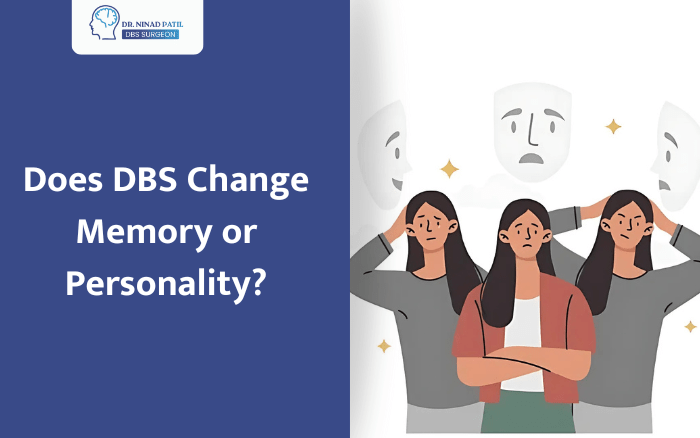If you or someone you love is thinking about Deep Brain Stimulation (DBS), you probably have two big questions: Will it affect my memory? and Could it change my personality? These are real concerns because while DBS is known for improving movement symptoms in conditions like Parkinson’s disease, it also works directly with the brain, which controls how we think, feel, and remember.
This blog breaks down what DBS is, what research says about its effects on memory and personality, and what you can do to reduce any risks. By the end, you’ll have a clear picture of what to expect so you can make an informed decision.
What is Deep Brain Stimulation (DBS)?
How DBS Works in the Brain
DBS involves placing thin wires, called electrodes, into specific areas of the brain. These are connected to a small device placed under the skin in the chest. The device sends mild electrical signals to help correct abnormal brain activity.
Common Conditions Treated with DBS
- Parkinson’s disease
- Dystonia
- Essential tremor
- Some types of epilepsy and obsessive-compulsive disorder (in select cases)
Why DBS is Different from Other Brain Surgeries
DBS does not remove or destroy brain tissue. Instead, it works like a “brain pacemaker,” adjusting electrical signals without permanently altering brain structure.
Can DBS Affect Memory?
What Studies Say About Memory Changes After DBS
Research shows that most people do not experience major memory loss after DBS. However, some patients notice small changes—like taking a bit longer to recall a word or name—especially in the weeks right after surgery.
Short-Term vs Long-Term Cognitive Effects
- Short-term: Mild difficulties with attention or word-finding may happen right after surgery but often improve with time.
- Long-term: For most, memory stays stable. In some cases, changes are more related to the underlying disease than the surgery itself.
Factors That Influence Memory Outcomes
- Age at the time of surgery
- Which part of the brain is targeted (e.g., subthalamic nucleus vs globus pallidus)
- Overall health and presence of other medical conditions
Can DBS Change Personality or Emotions?
Understanding Personality Shifts After DBS
True, lasting personality changes are rare. Some patients feel more energetic, while others feel more reserved. These shifts are usually mild.
Emotional Side Effects: Anxiety, Depression, or Apathy
Occasionally, changes in mood can occur—some people experience increased anxiety, depression, or lack of motivation (apathy). Adjusting DBS settings or adding supportive therapy often helps.
Differentiating Between DBS Effects and Disease Progression
It’s important to remember that Parkinson’s and other movement disorders can naturally affect mood and personality over time, even without DBS.
How Common Are These Side Effects?
Statistics from Clinical Studies
- Mild cognitive changes occur in a minority of patients
- Personality changes are reported less often than emotional changes
- Most patients report no major long-term effects on memory or personality
Why Most Patients Don’t Experience Major Personality Changes
Careful screening before surgery and close follow-up after can greatly reduce risks.
Managing and Monitoring Cognitive or Emotional Changes
Pre-Surgery Psychological Evaluation
Before DBS, patients often undergo memory and mood testing. This helps set a baseline and spot any changes later.
Post-Surgery Follow-Up and Support
Regular check-ups allow doctors to adjust DBS settings if mood or memory issues arise.
Role of Family and Caregivers in Monitoring Changes
Loved ones often notice changes sooner than the patient. Keeping track of these observations helps guide care.
DBS Benefits Often Outweigh the Risks
For many people, DBS leads to:
- Smoother, more controlled movements
- Lower medication doses (and fewer side effects from those medicines)
- Better ability to manage daily activities
When to Consult an Expert
If you’re worried about memory or personality changes, it’s worth discussing your concerns with a surgeon who has extensive DBS experience. They can explain the possible outcomes based on your specific condition and health profile.
FAQ
Q1: Does DBS cause permanent memory loss?
Most patients do not experience permanent memory loss. Mild issues that appear after surgery usually improve over time.
Q2: Will DBS change my personality completely?
No. Significant changes are rare, and most patients feel like themselves after recovery.
Q3: Can emotional changes after DBS be reversed?
Often yes. Adjusting the stimulation settings or adding supportive therapy can help.
Q4: Are cognitive changes more common in older patients?
Yes, older age and certain medical factors may increase the likelihood of mild changes.
Considering DBS? Speak to Dr. Ninad Patil in Pune Today
DBS is one of the most effective treatments for movement disorders, but it’s natural to wonder about its effects on memory and personality. The evidence shows that while mild changes can happen, serious or permanent effects are uncommon and the benefits for many patients are life-changing.
If you’re in Pune and thinking about DBS, talk to Dr. Ninad Patil, one of the most trusted DBS surgeon in the region. His experience in performing DBS surgeries has helped many patients regain control over their lives with confidence and safety.


